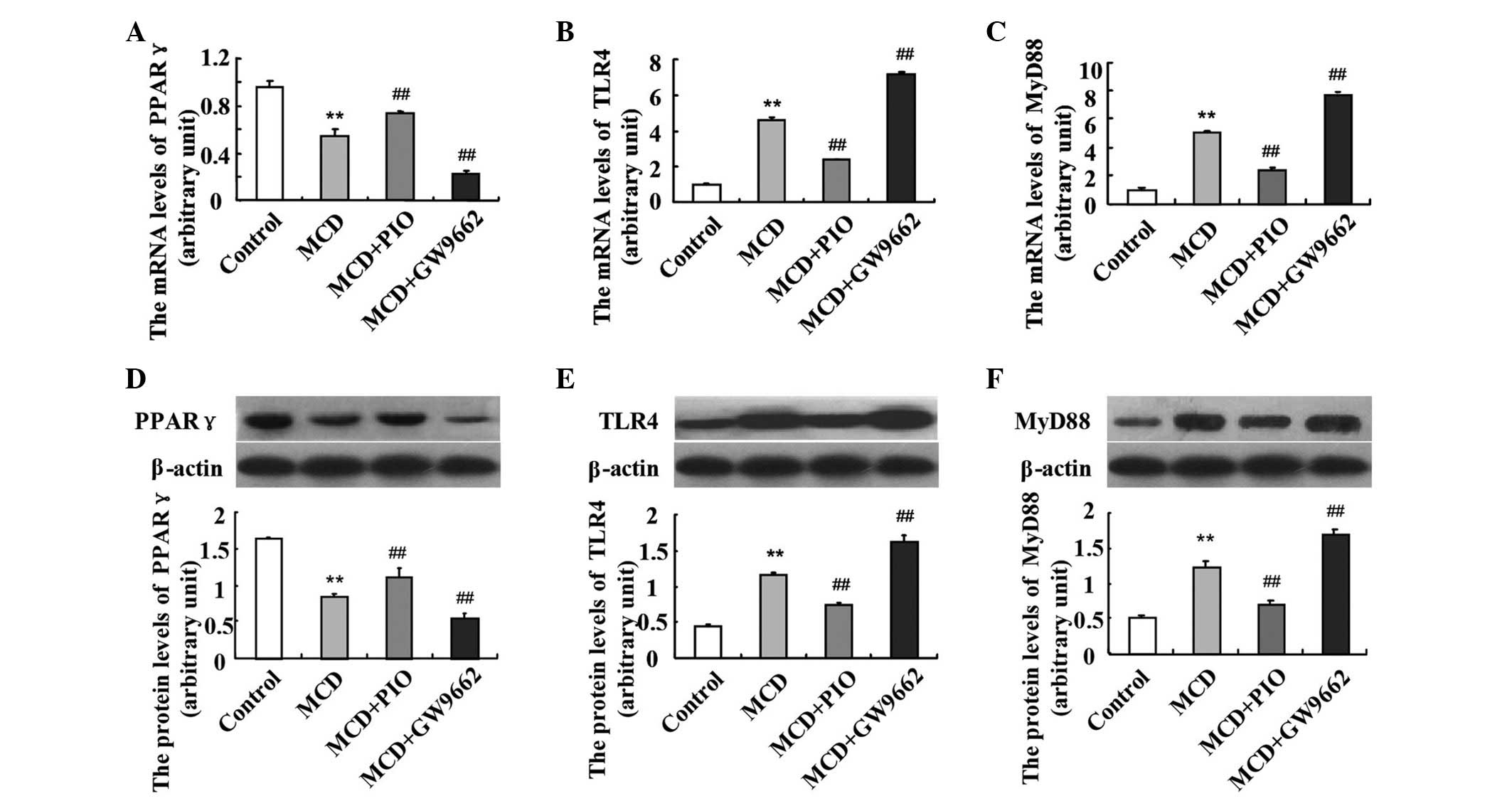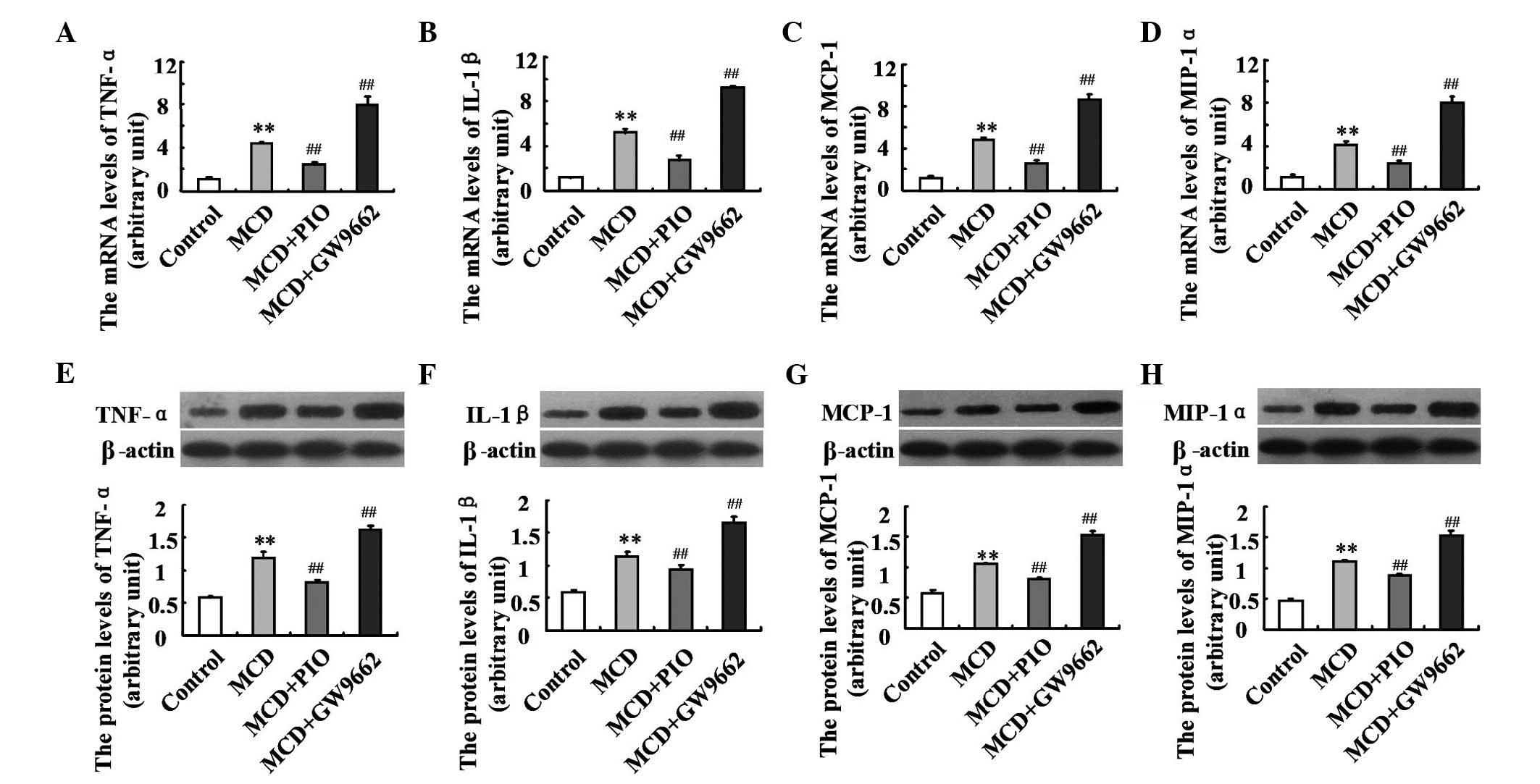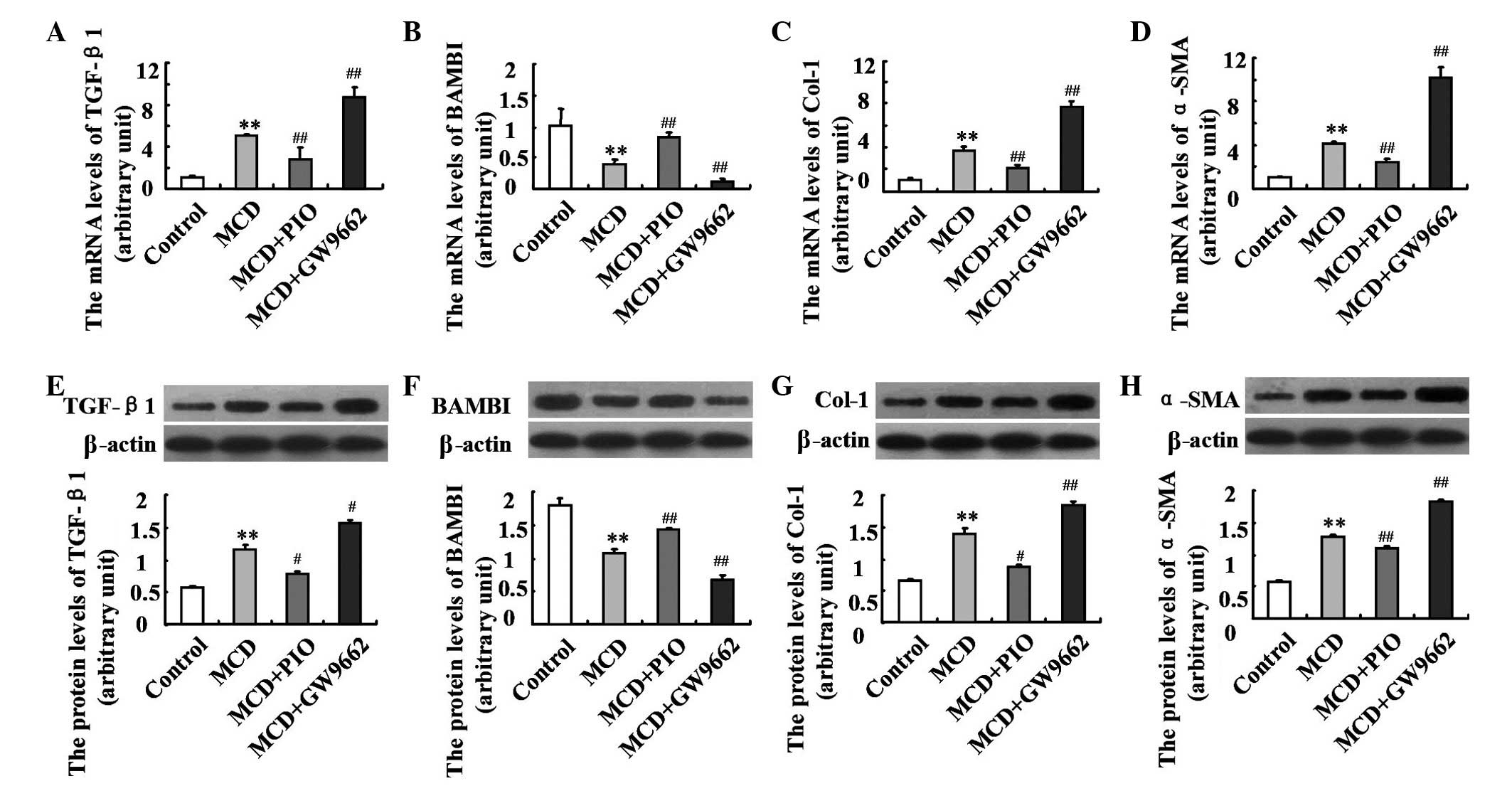|
1
|
Mitchell PS, Parkin RK, Kroh EM, Fritz BR,
Wyman SK, Pogosova-Agadjanyan EL, Peterson A, Noteboom J, O'Briant
KC, Allen A, et al: Circulating microRNAs as stable blood-based
markers for cancer detection. Proc Natl Acad Sci USA.
105:10513–10518. 2008. View Article : Google Scholar : PubMed/NCBI
|
|
2
|
Cohen JC, Horton JD and Hobbs HH: Human
fatty liver disease: Old questions and new insights. Science.
332:1519–1523. 2011. View Article : Google Scholar : PubMed/NCBI
|
|
3
|
Kelishadi R and Poursafa P: Obesity and
air pollution: Global risk factors for pediatric non-alcoholic
fatty liver disease. Hepat Mon. 11:794–802. 2011. View Article : Google Scholar
|
|
4
|
Söderberg C, Stål P, Askling J, Glaumann
H, Lindberg G, Marmur J and Hultcrantz R: Decreased survival of
subjects with elevated liver function tests during a 28-year
follow-up. Hepatology. 51:595–602. 2010. View Article : Google Scholar
|
|
5
|
Guo J and Friedman SL: Toll like receptor
4 signaling in liver injury and hepatic fibrogenesis. Fibrogenesis
Tissue Repair. 3:212010. View Article : Google Scholar
|
|
6
|
Fuentes E, Guzmán-Jofre L, Moore-Carrasco
R and Palomo I: Role of PPARs in inflammatory processes associated
with metabolic syndrome. Mol Med Rep. 8:1611–1616. 2013.PubMed/NCBI
|
|
7
|
Nan YM, Han F, Kong LB, Zhao SX, Wang RQ,
Wu WJ and Yu J: Adenovirus-mediated peroxisome proliferator
activated receptor gamma overexpression prevents nutritional
fibrotic steatohepatitis in mice. Scand J Gastroenterol.
46:358–369. 2011. View Article : Google Scholar
|
|
8
|
Nan YM, Fu N, Wu WJ, Liang BL, Wang RQ,
Zhao SX, Zhao JM and Yu J: Rosiglitazone prevents nutritional
fibrosis and steatohepatitis in mice. Scand J Gastroenterol.
44:358–365. 2009. View Article : Google Scholar
|
|
9
|
Ji Y, Liu J, Wang Z, Liu N and Gou W:
PPARgama agonist, rosiglitazone, regulates angiotensin II-induced
vascular inflammation through the TLR4-dependent signaling pathway.
Lab Invest. 89:887–902. 2009. View Article : Google Scholar : PubMed/NCBI
|
|
10
|
Leclercq IA, Lebrun VA, Stärkel P and
Horsmans YJ: Intrahepatic insulin resistance in a murine model of
steatohepatitis: Effect of PPARgamma agonist pioglitazone. Lab
Invest. 87:56–65. 2007. View Article : Google Scholar
|
|
11
|
Da Silva Morais A, Lebrun VA,
Abarca-Quinones J, Brichard S, Hue L, Guigas B, Viollet B and
Leclercq IA: Prevention of steatohepatitis by pioglitazone:
Implication of adiponectin-dependent inhibition of SREBP-1c and
inflammation. J Hepatol. 50:489–500. 2009. View Article : Google Scholar : PubMed/NCBI
|
|
12
|
Ballestri S, Lonardo A and Loria P:
Nonalcoholic fatty liver disease activity score and Brunt's
pathologic criteria for the diagnosis of nonalcoholic
steatohepatitis: What do they mean and do they agree? Hepatology.
53:2142–2143. 2011. View Article : Google Scholar : PubMed/NCBI
|
|
13
|
Alkhouri N, De Vito R, Alisi A, Yerian L,
Lopez R, Feldstein AE and Nobili V: Development and validation of a
new histological score for pediatric non-alcoholic fatty liver
disease. J Hepatol. 57:1312–1318. 2012. View Article : Google Scholar : PubMed/NCBI
|
|
14
|
Livak KJ and Schmittgen TD: Analysis of
relative gene expression data using real-time quantitative PCR and
the 2−ΔΔCt method. Methods. 25:402–408. 2001. View Article : Google Scholar
|
|
15
|
Estep M, Armistead D, Hossain N, Elarainy
H, Goodman Z, Baranova A, Chandhoke V and Younossi ZM: Differential
expression of miRNAsliver disease. Aliment Pharmacol Ther.
32:487–497. 2010. View Article : Google Scholar : PubMed/NCBI
|
|
16
|
Wang RQ, Nan YM, Wu WJ, Kong LB, Han F,
Zhao SX, Kong L and Yu J: Induction of heme oxygenase-1 protects
against nutritional fibrosing steatohepatitis in mice. Lipids
Health Dis. 10:312011. View Article : Google Scholar : PubMed/NCBI
|
|
17
|
Berlanga A, Guiu-Jurado E, Porras JA and
Auguet T: Molecular pathways in non-alcoholic fatty liver disease.
Clin Exp Gastroenterol. 7:221–239. 2014.PubMed/NCBI
|
|
18
|
Hasenfuss SC, Bakiri L, Thomsen MK,
Williams EG, Auwerx J and Wagner EF: Regulation of steatohepatitis
and PPARγ signaling by distinct AP-1 dimers. Cell Metab. 19:84–95.
2014. View Article : Google Scholar : PubMed/NCBI
|
|
19
|
Xu E, Forest MP, Schwab M, Avramoglu RK,
St-Amand E, Caron AZ, Bellmann K, Shum M, Voisin G, Paquet M, et
al: Hepatocyte-specific Ptpn6 deletion promotes hepatic lipid
accretion, but reduces NAFLD in diet-induced obesity: Potential
role of PPARγ. Hepatology. 59:1803–1815. 2014. View Article : Google Scholar
|
|
20
|
Villalpando-Arteaga EV, Mendieta-Condado
E, Esquivel-Solís H, Canales-Aguirre AA, Gálvez-Gastélum FJ,
Mateos-Díaz JC, Rodríguez-González JA and Márquez-Aguirre AL:
Hibiscus sabdariffa L. aqueous extract attenuates hepatic steatosis
through down-regulation of PPAR-γ and SREBP-1c in diet-induced
obese mice. Food Funct. 4:618–626. 2013. View Article : Google Scholar : PubMed/NCBI
|
|
21
|
Spruss A, Kanuri G, Wagnerberger S, Haub
S, Bischoff SC and Bergheim I: Toll-like receptor 4 is involved in
the development of frustose-induced hepatic steatosis in mice.
Hepatology. 50:1094–1104. 2009. View Article : Google Scholar : PubMed/NCBI
|
|
22
|
Wagnerberger S, Spruss A, Kanuri G,
Volynets V, Stahl C, Bischoff SC and Bergheim I: Toll-like
receptors 1–9 are elevated in livers with fructose-induced hepatic
steatosis. Br J Nutr. 107:1727–1738. 2012. View Article : Google Scholar
|
|
23
|
Shirai Y, Yoshiji H, Noguchi R, Kaji K,
Aihara Y, Douhara A, Moriya K, Namisaki T, Kawaratani H and Fukui
H: Cross talk between toll-like receptor-4 signaling and
angiotensin-II in liver fibrosis development in the rat model of
non-alcoholic steatohepatitis. J Gastroenterol Hepatol. 28:723–730.
2013. View Article : Google Scholar : PubMed/NCBI
|
|
24
|
Guo J and Friedman SL: Toll-like receptor
4 signaling in liver injury and hepatic fibrogenesis. Fibrogenesis
Tissue Repair. 3:21–39. 2010. View Article : Google Scholar : PubMed/NCBI
|
|
25
|
Szabo G, Velayudham A, Romics L Jr and
Mandrekar P: Modulation of non-alcoholic steatohepatitis by pattern
recognition receptors in mice: The role of toll-like receptors 2
and 4. Alcohol Clin Exp Res. 29(Suppl 11): S140–S145. 2005.
View Article : Google Scholar
|
|
26
|
Dauphinee SM and Karsan A:
Lipopolysaccharide signaling in endothelial cells. Lab Invest.
86:9–22. 2006. View Article : Google Scholar
|
|
27
|
Csak T, Velayudham A, Hritz I, Petrasek J,
Levin I, Lippai D, Catalano D, Mandrekar P, Dolganiuc A, Kurt-Jones
E and Szabo G: Deficiency in myeloid differentiation factor-2 and
toll-like receptor 4 expression attenuates nonalcoholic
steatohepatitis and fibrosis in mice. Am J Physiol Gastrointest
Liver Physiol. 300:G433–G441. 2011. View Article : Google Scholar : PubMed/NCBI
|
|
28
|
Aoyama T, Paik YH and Seki E: Toll-like
receptor signaling and liver fibrosis. Gastroenterol Res Pract.
2010:pii: 192543. 2010. View Article : Google Scholar : PubMed/NCBI
|
|
29
|
Baghy K, Iozzo RV and Kovalszky I:
Decorin-TGFβ axis in hepatic fibrosis and cirrhosis. J Histochem
Cytochem. 60:262–268. 2012.PubMed/NCBI
|
|
30
|
Li YS, Ni SY, Meng Y, Shi XL, Zhao XW, Luo
HH and Li X: Angiotensin II facilitates fibrogenic effect of TGF-β1
through enhancing the down-regulation of BAMBI caused by LPS: A new
pro-fibrotic mechanism of angiotensin II. PLoS One. 8:e762892013.
View Article : Google Scholar
|
|
31
|
Saiman Y, Agarwal R, Hickman DA, Fausther
M, El-Shamy A, Dranoff JA, Friedman SL and Bansal MB: CXCL12
induces hepatic stellate cell contraction through a
calcium-independent pathway. 305:G375–G382. 2013.
|
|
32
|
Cynis H, Kehlen A, Haegele M, Hoffmann T,
Heiser U, Fujii M, Shibazaki Y, Yoneyama H, Schilling S and Demuth
HU: Inhibition of glutaminyl cyclases alleviates CCL2-mediated
inflammation of non-alcoholic fatty liver disease in mice. Int J
Exp Pathol. 94:217–225. 2013.PubMed/NCBI
|
|
33
|
Heinrichs D, Berres ML, Nellen A, Fischer
P, Scholten D, Trautwein C, Wasmuth HE and Sahin H: The chemokine
CCL3 promotes experimental liver fibrosis in mice. PLoS One.
8:e661062013. View Article : Google Scholar : PubMed/NCBI
|
|
34
|
Gressner AM: Transdifferentiation of
hepatic stellate cells (Ito cells) to myofibroblasts: A key event
in hepatic fibrogenesis. Kidney Int Suppl. 54:S39–S45.
1996.PubMed/NCBI
|



















